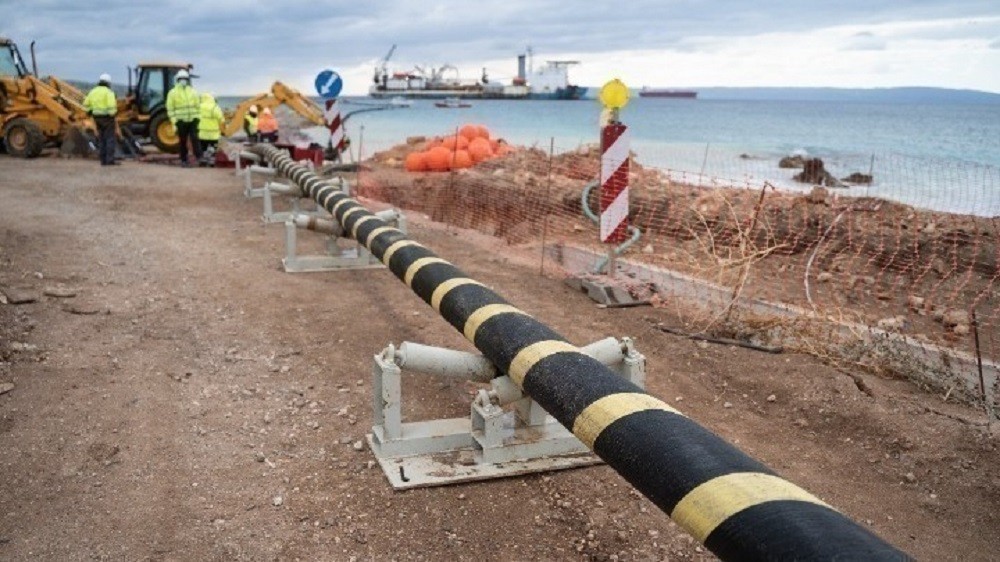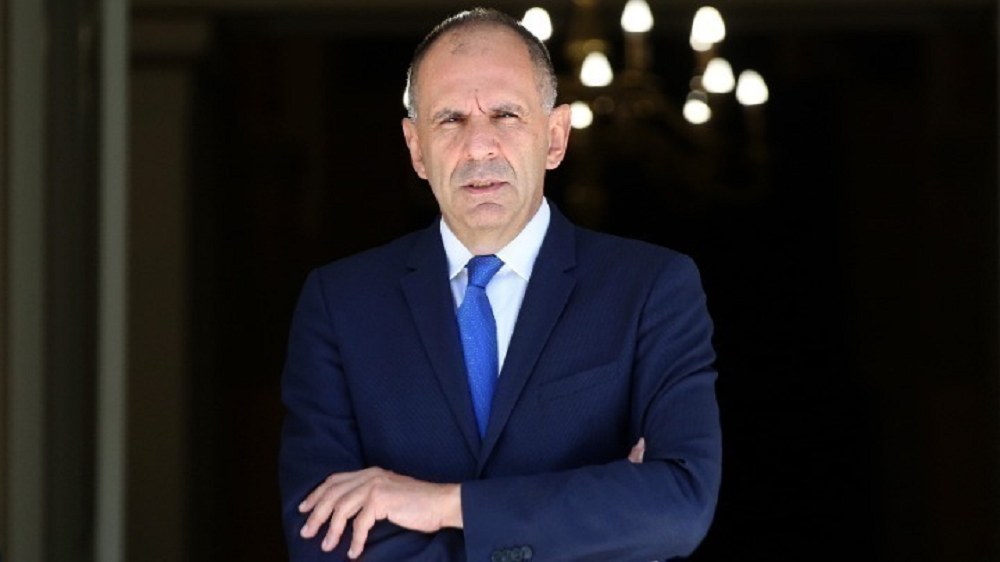
Prespes Agreement will further boost the European perspective of the Western Balkans, Cretu says
The Prespes Agreement, her own cooperation with the Greek government and the end of the fiscal adjustment programme in Greece, as well as the upcoming European elections, were among the issues touched upon by European Commissioner for Regional Policy Corina Cretu in an interview with the Athens-Macedonian News Agency (ANA).
She praised the dedication of the Greek authorities in making the best use of EU funds to carry out major infrastructure projects, such as the Tempi Tunnels.
On the Prespes Agreement, she noted that it was “an example of reconciliation for Europe as a whole and will give a further boost to the European perspective of the Western Balkans.”
On Greece’s exit from the stability support programme, Cretu noted that the country’s economy grew at an estimated rate of 2.0 pct in 2018 and is expected to continue growing at over 2 pct in the coming years.
On the European elections, meanwhile, the Commissioner noted that “Cohesion policy can be part of the solution” and a way of “promoting the European project”.
“Because our main goal is to reduce disparities between the regions and we want that every EU region, city and village to equally benefit from being part of this unique European project,” she added, noting that if all sides worked together, from a municipal to a national level, “we make miracles happen, we turn the impossible into new opportunities.”
The full interview with ANA’s Ioanna Kardara is given below:
1) Mrs Cretu, you said that you were proud of your presence along with the Greek prime minister at the opening of the new road at Tempi. What does Greece mean to you and how do you find your cooperation with the Greek government?
I very much value the excellent cooperation I have with the Greek authorities. I personally and my services will always be ready to support Greece in making the best use of Cohesion Policy funds. This is my 8th visit to Greece and I don’t think I have visited another EU country that often, except my home country of Romania. It is always with a renewed pleasure that I visit your beautiful country. I remember going to Greece in 2015, at the height of the crisis and I remember the dedication of the Greek authorities – national, regional and local alike – in making the best use of EU funds for the direct benefit of the Greek people.
I particularly appreciate this dedication, which helped your country achieve great things, like the Herculean works of the Tempi tunnels, which I was indeed very proud to inaugurate alongside Prime Minister Tsipras. I hope that your country will show the same dedication in the last stages of this programming period, to implement the remaining funding, and in the beginning of the 2021-2027 period. I have invited the Greek authorities to already start reflecting on what the next priorities for investment will be, especially since Greece will benefit from an increased envelope than in 2014-2020, with an additional € 1.5 billion.
2) The minister of Infrastructure, Transport and Networks, Christos Spirtzis, called you “ commissioner of the Balkans’’. Do you believe that the Prespes Agreement is the start of a new chapter for the Balkans?
From the very beginning, the European Union has strongly supported the historic agreement signed by Prime Ministers Tsipras and Zaev, following negotiations under the auspices of the UN. It took political courage, leadership and responsibility on all sides to resolve one of the most entrenched disputes in the region.
The two countries have seized this unique opportunity which sets an example of reconciliation for Europe as a whole and will give a further boost to the European perspective of the Western Balkans.
3) On August 2018, Greece exited the bailout program. Do you believe that Greece has been on a growth rate ever since?
Greece concluded its three year stability support programme in August 2018 with its place at the heart of the euro area and the European Union firmly secured. The successful conclusion of the programme is a testament to the efforts of the Greek people, the country’s commitment to reform, and the solidarity of its European partners.
Financial assistance was provided by Greece’s European partners on the basis of the implementation of a comprehensive and unprecedented reform package. This package was designed to take a coordinated approach to tackle long-standing and deep-rooted structural issues that contributed to Greece experiencing an economic crisis. They have laid the foundations for a sustainable recovery, putting in place the conditions needed for growth, job creation and sound public finances.
Greece’s economy grew at an estimated rate of 2.0% in 2018 and is expected to continue growing at over 2% in the coming years. It is crucial that the Greek authorities maintain ownership of agreed reforms and ensure their sustained implementation in order to protect and nurture economic growth in the years ahead.
4) Mrs Cretu, as the European Commissioner for regional policy, how would you and in general the European Union contribute to the reduction of the unemployment rate?
With respect to current employment and unemployment trends, the situation has been improving steadily, but a lot remains to be done. The unemployment rate has been on a steady downward trend, from a peak of 27.5% in 2013 to 18.5% as of November 2018. More jobs will be created as the economy recovers, and it is crucial that the overall framework remains conducive to sustainable and inclusive growth.
During the 2014-2020 programming period, the European Commission is funding actions promoting sustainable and quality employment, with € 1.75 billion of Cohesion Policy funds. In parallel, the Commission is investing in education and training in Greece with over € 1 billion. From this allocation, a significant amount is channeled towards expanding and upgrading apprenticeships and supporting reforms in technical education.
Many actions are unfolding as we speak and already by the end of 2018, over 150,000 unemployed had benefited from actions supported by the Commission under various programmes. However, fighting long-term unemployment is not a question related exclusively to the availability of funds. Greece also needs to implement policies that aim directly at improving employability prospects and promoting labour market participation in order to build on the progress it has made so far.
In this respect, Greece, with the support of the Commission, continues the process of modernising its public employment service, with new tools and structures being put in place to improve the level of services provided to both jobseekers and employers, offering a more individualised approach and facilitating job matching and activation opportunities. In addition to the reorganisation of the public employment service, the Greek authorities are also reshaping the broader system of active labour market policies, still with the support of the Commission.
5) What do you believe was your greatest achievement during your service as European Commissioner for Regional policy?
First of all, allow me to say that I am proud that during Juncker Commission’s mandate, we took measures specifically for Greece to help your country make full use of the Funds of the 2007-2013 period, and to launch rapidly the 2014-2020 period.
EU’ strong support for the 2007-2013 period – when we approved the increase of the co-financing rate to 100% with retroactive effect – really made a difference and Greece managed to maximize the use of the EU funds. Also for 2014-2020 period, EU accepted to take over the annual payment of additional pre-financing of 3.5% of total European funds for 2015 and for 2016, for further supporting the Greek economy. At a time of stretched financial liquidity, thanks to this decision, the Greek budget was exempt of paying € 1.6 billion, as the national co-financing rate for EU investments.
Over the last decades, Europe has done a lot for Greece. More than 100 billion euros have been invested since 1981 in your beautiful country through regional and cohesion funds to help the people finding new jobs or to start new business, to renovate schools and hospitals all over the country, or to support small and medium-sized enterprises to develop and hire people.
In more general terms, after 4 and half years since I am part of the Juncker Commissioner, I am proud of the other numerous achievements accomplished as far as Commissioner for Regional & Urban Policy.
For example, one of the first decisions that I made as EU Commissioner was to set up the Task Force for Better Implementation. Its main goal was to make a swift and good use of remaining Cohesion Policy funds from the 2007-2013 budget period, which otherwise might have been lost and would have then not served their purpose, which is to generate economic growth and job creation.
Thanks to the all the efforts of this Task Force, we succeed in helping eight Member States (Bulgaria, Croatia, Czech Republic, Hungary, Italy, Romania, Slovakia and Slovenia) to avoid the loss on the EU funds allocated to these countries, money that once were invested, had a big impact improving the day to day life of the people.
I am also proud of what we have achieved through the High Level Group on Simplification that I set up between July 2015 and November 2017. This is how we came up with solutions for drastically simplify the rules for accessing the EU funds, while keeping high standards in terms of sound management of EU funds. This also contributed to the proposal for a better Cohesion Policy in the next EU budget period starting in 2021. Among the outcomes of this Group, the Commission has already proposed some more favourable treatment of the SMEs investing in research and innovation, and the Commission’s legislative proposal for the post-2020 is 50% shorter than the current legislation.
Thirdly, I would mention both the ‘catching up regions’ and the ‘coal regions in transition’ initiatives, as there was the need to have in place tailor-made approaches to industrial transition and economic modernization, so that all EU regions can hold their own in a globalized world.
To be more concrete, with the ‘catching up regions’ initiative, we are helping low-income regions to overcome obstacles to growth related to the macroeconomic framework, structural reforms, governance and investment as well as EU Funds. Under this initiative, we have four pilot regions – two in Poland and two in Romania – leading to some significant structural changes there.
Then, with the ‘coal regions in transition’ initiative, we are targeting seven countries: Greece, Poland, Germany, Czechia, Romania, Bulgaria and Spain – where coal is still main energy and employment source. Through this initiative, we want to support them in the shift to modern and cleaner energy efficiency and to develop together with both local and national authorities pragmatic solutions to support the structural transformation process with flexibility. For instance, we agreed with the Czech authorities to specifically reallocate EUR 232 million to coal regions in transition.
6) Mrs Cretu, the European elections are coming, which dilemma do you believe that Europe is facing, given that the eurosceptic parties have increased and gain more and more supporters?
European elections should be about the European project: its principles, its achievements and its policies. Cohesion policy, one of the key EU policies, by funding hundreds of thousands of projects across Europe, ensures that every region, city and village across Europe can experience and can benefit from the European project.
Moreover, the strength of this EU policy derives precisely from the strong and direct link that we create with all EU regions and cities, at all levels – local, regional and national. Moreover, this link is crucial at a time when populism and Euroscepticism is doubting the. positive impact of the EU policies to our citizens.
For example, based on the outcomes of recent studies, we know the anti-EU vote is mainly driven by a combination of long-term economic and industrial decline and a lack of employment opportunities. There are places where there is a feeling of being left behind.
This is exactly where I believe that Cohesion policy can be part of the solution. Because our main goal is to reduce disparities between the regions and we want that every EU region, city and village to equally benefit from being part of this unique European project. Moreover, I would say, the most important thing is that we leave no one behind!
If we are to refer to your country, we have solid proves all over Greece of thousands of EU funded projects: hospitals, schools, metro lines, water or Internet infrastructure are shining throughout Greece as the concrete proof of European solidarity. I have in mind the Athens airport and metro, the solid waste management system in Western Macedonia and the concession motorways. Or, for Western Greece Region, I have in mind the new port of Patras, the Ionian and Olympia highways or the Rion-Antirion bridge; all of these EU investments offering economic opportunities and improving connectivity as well. So, I think that we proved that working together, we succeeded!
The truth is when we work together as Europeans – involving national governments, cities, regions and social partners – we make miracles happen, we turn the impossible into new opportunities.
This is when Cohesion policy is Europe at its best; it is Europe that combines investment with care.
This is why it is essential for all of us who know how this policy really makes a real difference in people’ lives, to speak up on the benefits of Cohesion Policy and of the European Union at large. It is important if not crucial for people to be well informed when they to go out and vote.
More than 30 million travellers came to Greece in 2018, central bank reports
Source: ANA-MPA

